Why this resume works
- Quantifies accomplishments: The applicant illustrates measurable impact by quantifying achievements like a 15% efficiency improvement and $10,000 monthly savings.
- Showcases career progression: Progressing from energy systems analyst to power engineer reflects increasing responsibility, showcasing growth in leadership and complex problem-solving roles across diverse organizations.
- Uses action-oriented language: Strong action verbs such as “optimized,” “led,” and “analyzed” emphasize initiative and effectiveness.
More Power Engineer Resume Examples
Browse our power engineer resume examples to learn how to highlight your technical skills, industry experience, and project management abilities. These energy resume samples guide you in creating a resume that attracts potential employers.
Entry-Level Power Engineer
Why this resume works
- Centers on academic background: The education section highlights advanced degrees in electrical engineering, showcasing the applicant’s strong academic background and early career achievement.
- Effective use of keywords: Incorporating keywords like “renewable energy solutions” and “project management” ensures this resume aligns with industry requirements for better ATS compatibility.
- Shows digital literacy: Leveraging tools for advanced electrical schematics illustrates the applicant’s grasp of necessary computer skills in today’s tech-driven work environments.
Mid-Level Power Engineer
Why this resume works
- Points to measurable outcomes: Quantifiable outcomes like reducing operational costs by $10k monthly and increasing revenue by $500k show the applicant’s effectiveness in achieving significant financial improvements.
- Displays technical expertise: Technical expertise shines through with certifications from IEEE and accomplishments like developing a patented energy optimization algorithm, showcasing their deep knowledge in electrical systems.
- Includes a mix of soft and hard skills: Combining technical skills with interpersonal skills, such as leading teams on major projects, highlights a well-rounded professional capable of managing both tasks and people effectively.
Experienced Power Engineer
Why this resume works
- Focuses on work history: Employing a chronological resume format, the applicant outlines a solid progression in energy roles, showcasing extensive experience and growth through impactful achievements at each position.
- Lists relevant certifications: Including certifications, such as Certified Energy Manager and Professional Engineer, highlights the applicant’s dedication to staying current in industry practices.
- Showcases impressive accomplishments: By detailing accomplishments such as reducing costs with AI tools, the applicant effectively emphasizes their significant impact on business efficiency.
Power Engineer Resume Template (Text Version)
Hiro Tanaka
San Diego, CA 92103
(555)555-5555
Hiro.Tanaka@example.com
Professional Summary
Accomplished Power Engineer with 4 years of experience. Proven expertise in optimizing energy efficiency and managing complex electrical systems. Strong analytical skills and a track record of reducing costs through strategic planning.
Work History
Power Engineer
Energy Solutions Inc – San Diego, CA
July 2023 – July 2025
- Improved power efficiency by 15% across facilities.
- Led a team to reduce energy costs by ,000 monthly.
- Optimized system performance using advanced analytics.
Electrical Engineer
VoltTech Industries – San Francisco, CA
January 2021 – June 2023
- Reduced operational downtime by 25% through strategic planning.
- Conducted safety audits, enhancing compliance by 30%.
- Developed maintenance protocols, saving ,000 annually.
Energy Systems Analyst
EcoEnergy Corp – Riverside, CA
July 2019 – December 2020
- Analyzed energy data, boosting optimization by 18%.
- Drafted energy reports that increased transparency by 40%.
- Led training sessions, enhancing team efficiency by 20%.
Languages
- Spanish – Beginner (A1)
- French – Intermediate (B1)
- German – Beginner (A1)
Skills
- Power Systems Analysis
- Energy Efficiency Optimization
- Electrical Circuit Design
- Renewable Energy Integration
- Project Management
- Data Analysis
- Safety Compliance
- Technical Reporting
Certifications
- Certified Energy Manager – Association of Energy Engineers
- Professional Engineer (PE) – National Society of Professional Engineers
Education
Master of Science Electrical Engineering
Massachusetts Institute of Technology Cambridge, MA
May 2018
Bachelor of Science Electrical Engineering
University of California, Berkeley Berkeley, CA
May 2016
Related Resume Guides
Advice for Writing Your Power Engineer Resume
Explore our tailored tips on how to write a resume for a power engineer position and discover how to highlight your technical skills and experience in the energy sector. Whether you’re just starting or looking to advance, these insights will help you create a standout resume that stands out to potential employers.
Highlight relevant technical skills
For a power engineer, strong technical skills are essential as they demonstrate your ability to manage complex systems, solve problems efficiently, and maintain reliable operations.
Including a dedicated skills section on your resume makes it easy for employers to quickly assess your qualifications. You can also reinforce these skills throughout your work experience section by highlighting how you’ve applied them in real-world scenarios.
Valuable technical skills for power engineers often include expertise in electrical systems and circuit design, proficiency with CAD software, and experience with power distribution equipment. Familiarity with renewable energy technologies is increasingly sought after as the industry evolves. Employers also value critical thinking and the ability to develop practical solutions under pressure.
When listing technical skills, present them using bullet points or concise phrases. This format ensures your abilities are easy to scan and emphasizes your fit for the role. Showcasing these qualifications effectively helps position you as a capable and dependable candidate for a power engineering position.
Example of a technical skills section
- Power system analysis (PSS/E, ETAP)
- Renewable energy integration
- Protective relaying and coordination
- Load flow analysis
- SCADA systems
- Energy management systems (EMS)
- Transmission and distribution design
- Electrical safety standards (IEEE, IEC)
- Arc flash analysis
- Transformer testing and diagnostics
You can use our Resume Builder to craft a resume that highlights technical skills in addition to key soft skills like teamwork, communication, and adaptability.
Quantify your accomplishments
Quantifying your accomplishments as a power engineer makes your resume more impactful by clearly showing the results you’ve delivered.
Rather than simply listing tasks like “managed projects” or “maintained systems,” use measurable outcomes to highlight your contributions. For example, “reduced energy costs by 15%” or “completed a power system upgrade two weeks ahead of schedule.” This level of detail helps employers quickly understand the value you bring.
In the work experience section, include your job title, employer name, location, and dates of employment, then focus on turning responsibilities into achievements.
Use strong action verbs like “optimized,” “streamlined,” or “improved” alongside metrics to emphasize results. Quantified accomplishments demonstrate your ability to solve problems, increase efficiency, and drive success—giving hiring managers a clear reason to move your application forward.
5 power engineer work history bullet points
- Monitored and maintained power generation equipment, achieving a 98% uptime across operational systems.
- Developed energy optimization strategies that reduced operational costs by 12% annually.
- Conducted safety audits and risk assessments, decreasing workplace incidents by 25%.
- Implemented advanced diagnostic tools to troubleshoot system issues, improving repair turnaround times by 40%.
- Collaborated with cross-functional teams to upgrade infrastructure, increasing energy output capacity by 15%.
Make your resume stand out by checking out these professional resume examples. They show you what works so you can create a strong resume faster.
Write a powerful professional summary
A professional summary on a resume serves as an introduction for hiring managers, providing a snapshot of your skills and accomplishments. You can decide whether to use a summary or a resume objective based on your experience level and career goals.
A professional summary is a concise, three to four sentence snapshot of your experience, key skills, and career achievements. It’s especially useful for experienced candidates, such as power engineers, who want to highlight their expertise and the value they bring to an organization. This section helps grab the hiring manager’s attention by showcasing your impact and professional strengths right from the start.
On the other hand, a resume objective states your career goals. It’s ideal for entry-level candidates, career changers, or those with job gaps. While summaries focus on “what I’ve accomplished,” objectives emphasize “what I aim to contribute.” Let’s look at examples for different industries and experience levels so you can decide which one suits your situation as a power engineer.
Power engineer resume summary examples
Entry-level
Recent electrical engineering graduate with a focus on power systems and renewable energy. Completed coursework in power generation, transmission, and distribution, complemented by an internship at a local utility company. Certified in AutoCAD and MATLAB with strong analytical skills and a keen interest in sustainable energy solutions.
Mid-career
Power engineer with seven years of experience in designing and implementing electrical systems for industrial plants. Proven track record in optimizing power distribution networks to improve efficiency. Experienced in managing cross-functional teams and coordinating large-scale projects under tight deadlines. Holds a Professional Engineer (PE) license and has expertise in SCADA systems.
Experienced
Seasoned power engineer specializing in smart grid technology and renewable energy integration. Over 15 years of experience leading high-impact projects that improve grid reliability and reduce carbon footprint. Known for strategic leadership abilities, innovative problem-solving, and fostering partnerships across the energy sector. Holds an MBA with a concentration in Energy Management.
Power engineer resume objective examples
Recent graduate
Energetic and detail-oriented recent electrical engineering graduate with a focus on power systems, seeking an entry-level power engineer role to apply technical skills and theoretical knowledge. Committed to contributing to sustainable energy solutions and improving grid reliability.
Career changer
Dedicated professional transitioning from mechanical engineering into the power engineering field, leveraging analytical skills and problem-solving abilities developed through industry experience. Eager to support innovative projects aimed at improving energy efficiency and infrastructure resilience.
Specialized training
Graduate with specialized training in renewable energy technologies, seeking a position as a power engineer. Passionate about using educational background in solar and wind energy systems to support the development of clean, sustainable energy projects.
Select a straightforward resume template with clear sections to showcase your skills and experience, steering clear of elaborate fonts or excessive design elements.
Showcase your credentials
Listing your certifications, licenses, and specialized training is important for a power engineer. These credentials show that you have the necessary skills and knowledge to do the job well.
They also help employers see that you are up-to-date with industry standards and can handle complex tasks safely and efficiently.
Creating a dedicated certifications section on your resume makes it easy for hiring managers to find this information quickly. Here are a few examples of certifications for your resume:
- Professional Engineer (PE or P.Eng.) License
- Certified Energy Manager (CEM)
- Certified Power Systems Professional (CPSP)
- OSHA Safety Certification
- NFPA 70E Certification (Electrical Safety in the Workplace)
- LEED Accredited Professional (LEED AP)
- AutoCAD Electrical Certification
- SCADA Systems Certification
Adding these certifications to your resume can set you apart from other applicants. It shows that you are committed to your field and have taken extra steps to expand your expertise. Including this section along with your education helps paint a complete picture of your qualifications.
Example of a certifications section
Power Engineer Certification
Issued by: Association of Power Engineers (APE)
Issued 2022
Certified Energy Manager (CEM)
Issued by: Association of Energy Engineers (AEE)
Expires 2025
Professional Engineer (PE) License
Issued by: State Board of Professional Engineers
Issued 2020
HVAC Excellence Certification
Issued by: ESCO Institute
Expires 2024
OSHA Safety Certificate
Issued by: Occupational Safety and Health Administration (OSHA)
Issued 2021
Use a polished and professional resume format that aligns with your experience level to ensure your skills and qualifications stand out to hiring managers.
FAQ
Do I need to include a cover letter with my power engineer resume?
Yes, including a cover letter with your power engineer resume can improve your application. It gives you the chance to show your enthusiasm for the role and company, while highlighting specific projects or experiences that fit the job requirements.
For instance, if the company is known for renewable energy projects and you have relevant experience in that area, it’s a great opportunity to emphasize this.
You might consider using tools like our Cover Letter Generator to help draft a personalized letter based on your resume details or create one from scratch with professional tips.
Additionally, exploring cover letter examples tailored to engineering roles can offer inspiration and ensure you’re presenting yourself effectively.
How long should a power engineer’s resume be?
For a power engineer, the ideal resume length depends on your experience. If you’re early in your career or have limited work history, aim for a concise one-page resume that highlights key skills like electrical systems design, power distribution, and relevant certifications. Focus on projects or internships that showcase your technical expertise.
For mid-level or senior engineers with extensive experience, a two-page resume is acceptable to fully detail complex projects, leadership roles, and advanced certifications like PE licensure. Just ensure every entry adds value and stays relevant to the role.
If you’re unsure about what works best for you, explore resources on how long a resume should be to tailor it effectively for your career stage.
How do you write a power engineer resume with no experience?
If you have no experience yet, focus your power engineer resume on your education, relevant coursework, and skills that align with the industry. Here are a few tips to help you get started:
- Highlight your education: Start with your degree in engineering or a related field. Include the name of your institution, graduation date, and any honors or awards.
- Leverage coursework and projects: Mention any projects or courses that are directly applicable to power engineering, like electrical systems design, energy conversion, or renewable energy technologies.
- Showcase technical skills: List programming languages (like Python or MATLAB), software (such as AutoCAD or PowerWorld), and other technical proficiencies like circuit analysis that are important for a power engineer role.
- Include internships or volunteer work: If you’ve done any internships, co-ops, or volunteer projects related to engineering, describe what you did and what you learned.
- Highlight soft skills: Communication, teamwork, and problem-solving are key in engineering. Mention experiences where you’ve demonstrated these abilities.
Check out our guide on writing a resume with no experience to ensure you’re presenting yourself effectively even without direct experience.
Rate this article
Power Engineer
Additional Resources
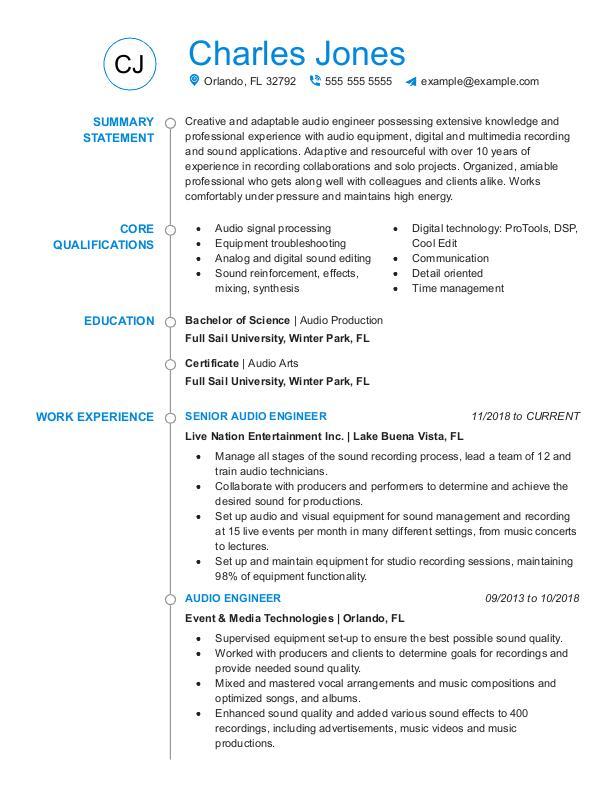
Audio Engineer Resume Guide + Tips + Example
Seeking a job as an audio engineer? A well-written Resume is a great place to start, and we’re here to help! This guide to writing an effective audio engineer Resume
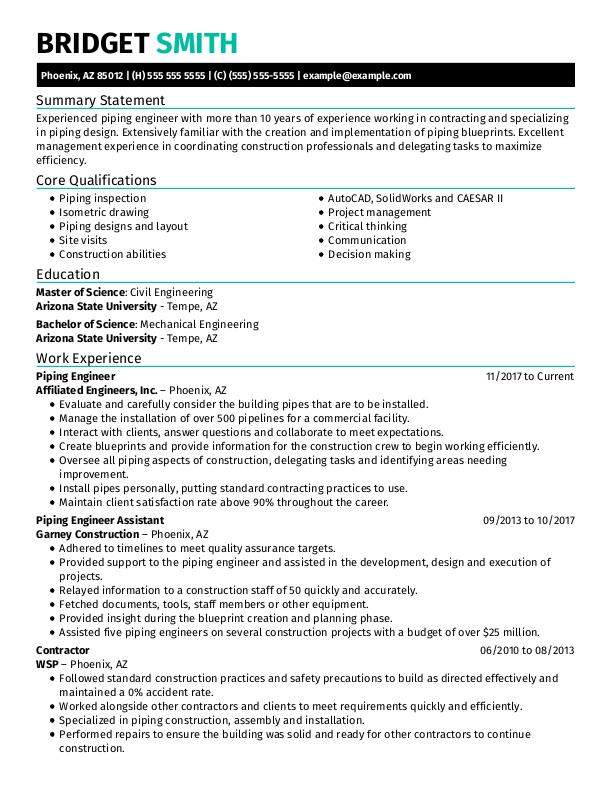
Piping Engineer Resume Examples & Templates
Piping engineers are pivotal in ensuring the seamless operation and efficiency of project environments, supporting teams and spearheading the engineering solutions that lead to the success of complex industrial projects. With
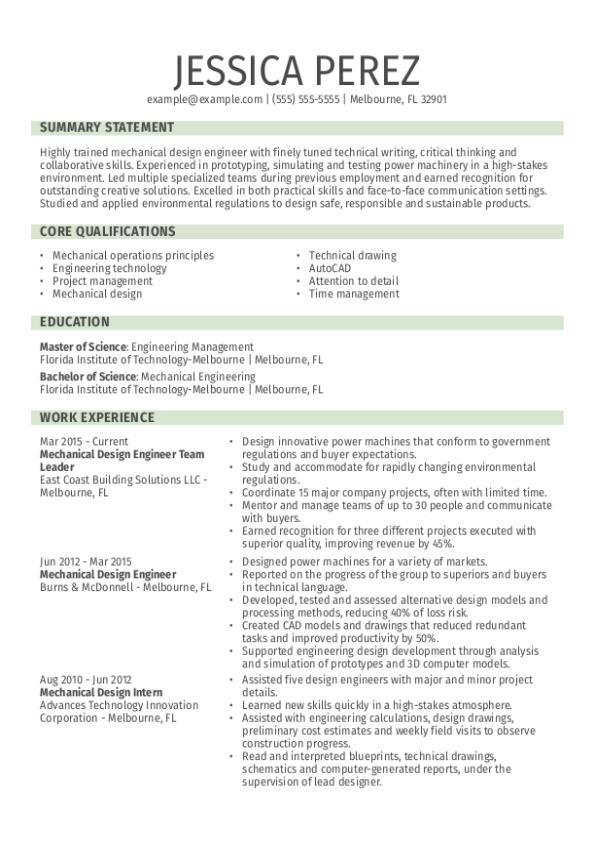
Mechanical Design Engineer Resume Guide + Tips + Example
Seeking a job as a mechanical design engineer? A well-written Resume is a great place to start and we’re here to help! This guide to writing an effective mechanical design
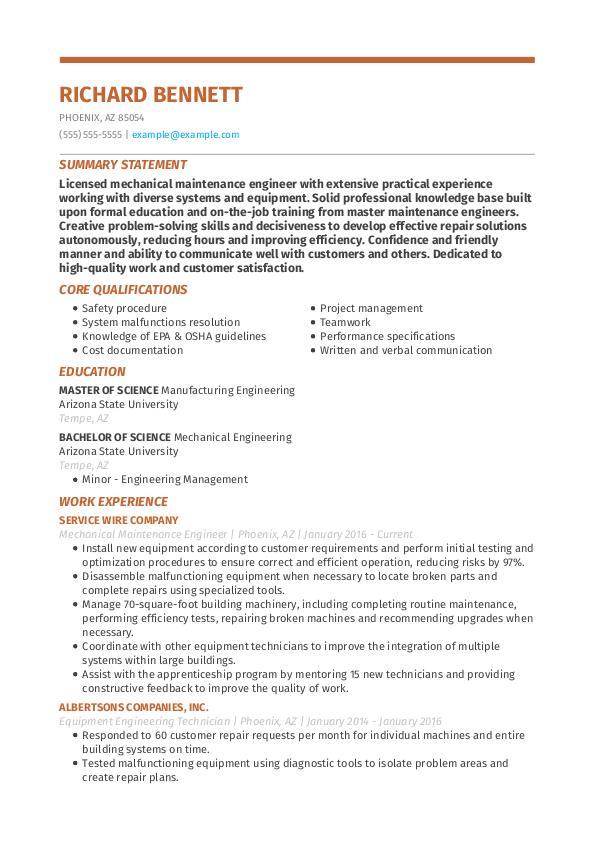
Maintenance Engineer Resume Guide + Tips + Example
Propel your career with an effective maintenance engineer Resume. We have created the perfect guide to help you create an effective maintenance engineer Resume, with tips on what to add,

Engineering CV Examples & Templates
Engineers play many roles in designing, building and improving infrastructures, technologies, medical equipment and more. Employment in this occupation is expected to grow 4% over the next decade, bringing in
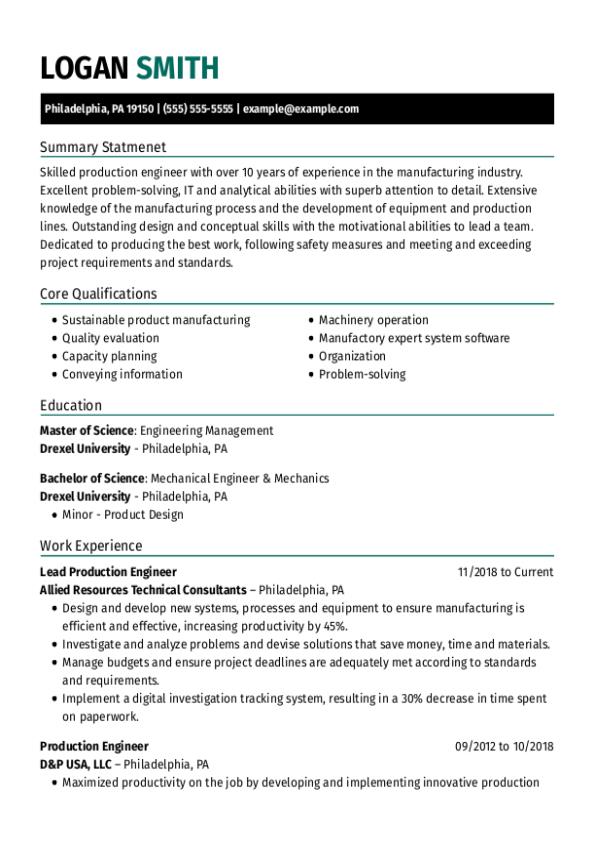
Production Engineer Resume Guide + Tips + Example
Seeking a job as a production engineer? A well-written Resume is a great place to start, and we’re here to help! This guide to writing an effective production engineer Resume
